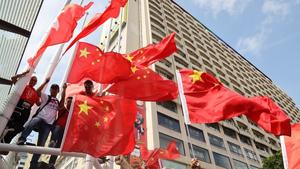 People wave the national flag the flag of HKSAR to support Hong Kong at Tsim Sha Tsui, Hong Kong on Aug 13, 2019. (EDMOND TANG / CHINA DAILY)
People wave the national flag the flag of HKSAR to support Hong Kong at Tsim Sha Tsui, Hong Kong on Aug 13, 2019. (EDMOND TANG / CHINA DAILY)
China's adoption of a national security law for Hong Kong is a necessary move by the government in Beijing to maintain regional safety and stability, Russian officials and experts said.
Mikhail Markelov, first deputy chairman of the United Russia party and a lawmaker in the national legislature, or Duma, said Russia gives its full support to the Chinese central government's policies in relation to Hong Kong.
The new law does not conflict with the human rights system, because the law is aimed at protecting the interests of Hong Kong, preventing the blatant interference by external forces, and cracking down on the powers that had tried to ruin the stability of China. It will protect these interests in accordance with the law
Mikhail Markelov, first deputy chairman of the United Russia party and a lawmaker in Duma
The Law of the People's Republic of China on Safeguarding National Security in the Hong Kong Special Administrative Region, or HKSAR, was passed unanimously by the National People's Congress, China's top legislature, on Tuesday.
"The new law does not conflict with the human rights system, because the law is aimed at protecting the interests of Hong Kong, preventing the blatant interference by external forces, and cracking down on the powers that had tried to ruin the stability of China. It will protect these interests in accordance with the law," Markelov said.
He said that while Hong Kong society had for years shown a willingness to create a law protecting the SAR from the interference of some Western countries, it had not been able to realize this goal.
"The United States and some European countries ignored the domestic instabilities, and kept encouraging the violent protests in Hong Kong, which is incredible to me," said Markelov.
He said the US had never given up on its interference in Hong Kong affairs, even as the US itself suffered from protests on the streets and widespread vandalism.
READ MORE: US bill on HKSAR condemned
Domestic affair
Russian Foreign Minister Sergey Lavrov agrees with Markelov, saying Russia views the HKSAR as China's domestic affair.
During an interview with Chinese and Russian media, Lavrov said Hong Kong affairs fall within China's domestic affairs and Washington's threats to impose sanctions on China fully expose its sense of superiority and impunity. This is also not conducive to effective dialogue between the US and China on other issues, he said.
Sergey Sanakoyev, president of the Russian-Chinese Analytical Center, said the newly adopted law will not undermine Hong Kong's status as an international financial center. Instead, it will provide a more stable environment for business operations and investment in the region.
Hong Kong used to be "a peaceful harbor of global investment", but the violent protests-including the acts of vandalism-have undermined its fundamentals as a commercial center. The new law is a response to the external interference, Sanakoyev said.
He said that those Western countries that are threatening China with sanctions are hurting their own interests.
"The rest of the world will continue to trade with China, and they would be glad to have deeper commercial interactions with both the Chinese mainland and Hong Kong," Sanakoyev said.
"In my opinion, the new law is a step that will boost the economic stability of Hong Kong," the expert said.
Sanakoyev said the law is all about ensuring national security, a condition that is considered essential for any country.
ALSO READ: Separatists urged to turn over a new leaf
"The external anti-China forces found an opportunity to interfere in the internal affairs of China due to the lack of appropriate laws and the destruction carried out by the rioters," he said.
"The law will help allow Hong Kong to quickly resist external interference and maintain its stability."


